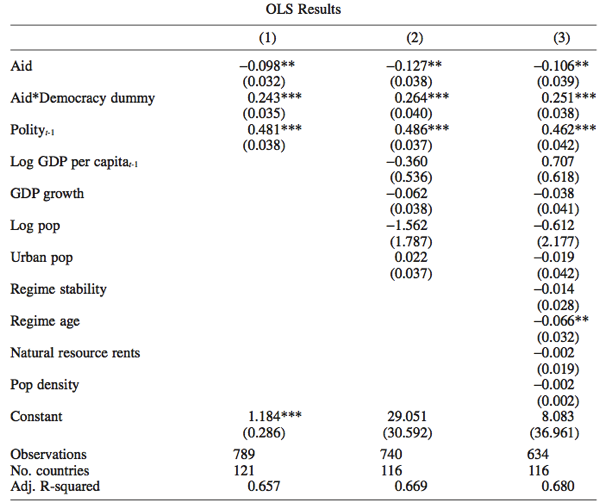Ett nytt papper i Kyklos av Dutta, Leeson & Williamson om hur bistånd påverkar graden av demokrati:
How does foreign aid affect recipient countries' political institutions? Two competing hypotheses offer contradictory predictions. The first sees aid, when delivered correctly, as an important means of making dictatorial recipient countries more democratic. The second sees aid as a corrosive force on recipient countries' political institutions that makes them more dictatorial. This paper offers a third hypothesis about how aid affects recipients' political institutions that we call the “amplification effect.” We argue that foreign aid has neither the power to make dictatorships more democratic nor to make democracies more dictatorial. It only amplifies recipients' existing political institutions. We investigate this hypothesis using panel data for 124 countries between 1960 and 2009. Our findings support the amplification effect. Aid strengthens democracy in already democratic countries and dictatorship in already dictatorial regimes.
Det bloggades om pappret redan 2007, så jag anar att de siktade högre än Kyklos, men att den kausala identifikationen anses lite skakig. Det är paneldata, dock med laggad beroendevariabel:

Effekten är hyfsat stor:
...panel data that cover 124 developing countries over half a century between 1960 and 2009. Our results support the amplification hypothesis. A one standard deviation increase in foreign aid increases the average democracy’s Polity score, or strengthens its democracy, by approximately one standard deviation.
De kör GMM också, och en IV-skattning (med samma resultat). Så hur instrumenteras bistånd?
We instrument aid and our interaction term with the logarithm of coun- tries’ average incomes lagged one period, the logarithm of countries’ population multiplied by their Polity scores lagged two periods, and a group of variables that capture donors’ strategic interests in giving aid. These include binary variables equal to one if a country is located in Sub-Saharan Africa or the Franc Zone, or is a Central American country or Egypt, and zero otherwise.
Deras slutsatser:
Although it is true that giving additional aid to already democratic nations will not, it seems, lead to greater autocracy, as the critics of aid sometimes suggest, more important, it appears that aid for the purposes of democratizing the dictatorial developing world may not only fail, but may actually cause harm.